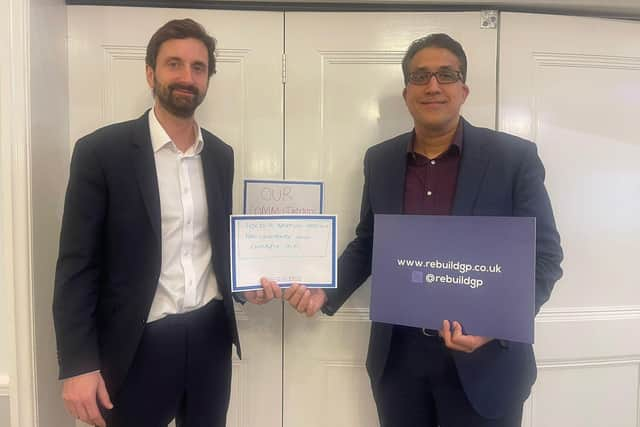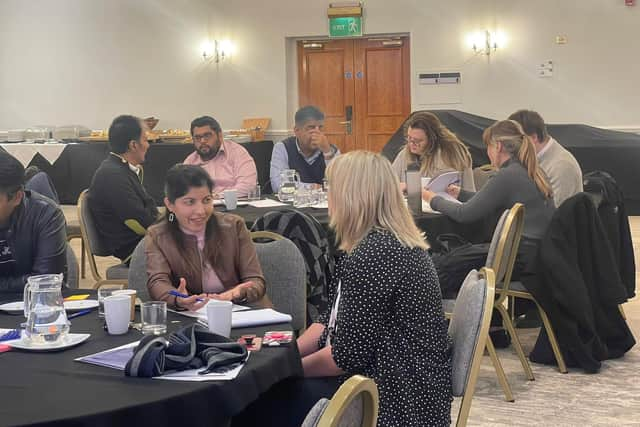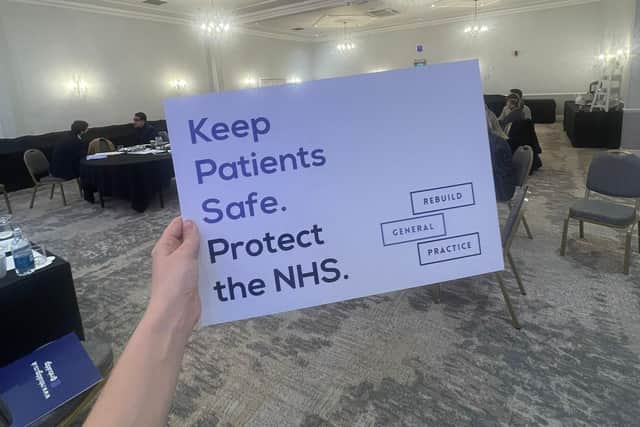Lancashire doctor calls for 'honest conversation' with patients about what GPs can do
and live on Freeview channel 276
Dr. Adam Janjua, a GP from Fleetwood - who is also chief executive of the Consortium of Lancashire and Cumbria Local Medical Committees - has warned that urgent action is needed to stem the flow of doctors leaving the profession, if growing pressure on primary care services is to be put into reverse.
He was speaking after the Preston-based consortium hosted national campaign group Rebuild General Practice in the city for its North West roadshow earlier this month. The event saw GPs from across the region gather as part of an attempt to unite politicians, patients and NHS staff around a long-term vision for general practice.
Advertisement
Hide AdAdvertisement
Hide AdDr.Janjua said that GPs were isolated figures within the NHS, who worked like “beavers”, hidden in their own consolation rooms - and whom political leaders found it easy either to overlook or peddle "rhetoric" about, in spite of the fact they are actually seeing more patients.


"Everyone was thinking that [general practice] was doing fine, which it probably was in the mid-2000s - things were going smoothly. But I think, since then, it's gradually just been eroding - and people haven't noticed.
“Unfortunately, it's much like the analogy of termites eating a chair - you don't really notice when the structural integrity was breached to the [extent] where it was unsafe. But when somebody sits on it and it collapses, then you know the chair’s broken.
“[We need] a good, constructive dialogue with patients and the public about what they can expect from the NHS versus what they want from the NHS. Because gone are the days when we have 100 percent been able to cater for what everybody wants - it's more about needs now,” Dr. Janjua said.
Advertisement
Hide AdAdvertisement
Hide AdHe acknowledged that it was “difficult” for some patients to get through to their GP and blamed the “chipping away” of funding for primary care for many of the service’s ills, as well as their most worrying symptom - the number of GPs leaving the profession far earlier than they might otherwise have done.


The government promised four years ago to boost GP numbers by 6,000 by 2024. By October this year, there were 2,850 more full-time equivalent GPs working in the NHS than in December 2019 - but that figure includes locums providing cover and also trainee GPs who are not fully qualified, still require supervision and do not spend all of their time in practice.
If locums and trainees are excluded from the tally, then there were 406 fewer GPs in October 2023 than at the time of the last general election.
The Health Foundation thinktank says that the number of full-time equivalent, fully qualified and permanent GPs is the best measure of GP workforce capacity - and that shows a long-term decline, down by just over 2,000 between September 2015 and July this year.
Advertisement
Hide AdAdvertisement
Hide AdDr. Janjua says that the premature loss of “experienced” GPs in their mid-50s is a major problem - and one that cannot not be fixed by long-term pledges by politicians.


“They're getting a bit fed up with the state of affairs at the moment and if they retire, there's a big brain drain that you will struggle to replace, because it takes years to train someone up.
“That experience that you get on the job is a very valuable component to have - and we shouldn't be quick to distort it by saying, ‘Well 3,000 GPs have left, [so] we can get 3,000 more. It's not going to be the same thing, because it can be 15 years before they're at that level.
“An experienced GP working at their peak performance can save a huge chunk of referrals [to] hospital, a lot of prescriptions [and] a lot of work.
Advertisement
Hide AdAdvertisement
Hide Ad“If you start increasing medical school places now…[then] in 10 years, you will get a GP coming through the system - which is why it's all the more desirable to actually keep the ones you have,” Dr. Janjua explained.
He said that increased funding would enable partners in GP practices to recruit salaried GPs - at a rate that made them feel “valued” - which would reduce the strain on individual doctors and improve services for patients, demand from whom had been increasing even before the additional pressures brought by the pandemic
NHS England runs several recruitment and retention schemes for general practice and currently offers almost 800 places per year on a programme designed to recruit doctors in parts of the country where it has proved difficult - by offering a one-off incentive of £20,000.
However, Dr. Janjua said he feared that pressure on the healthcare system overall would see further financial cuts to primary care rather than the fair share that the Rebuild General Practice campaign was calling for. He also warned that it was vital not to “level down” any differences in funding between individual surgeries across Lancashire, but instead to lift all areas up to the level they require.
Advertisement
Hide AdAdvertisement
Hide Ad“At some stage in the future, If there is more funding…you can have a chat about [trying to] do the ‘extra good’ stuff. But at the moment, we need to look at what we can…afford to provide people rather than what they want us to provide.
“It's not [about] redesigning general practice, it is about trying to build the foundations…until we get to a point where it's sustainable,” Dr. Janjua said.
‘WE’RE LOOKING TO THE LONG TERM’
Addressing the issues raised by Dr. Janjua, a Department of Health and Social Care spokesperson said: “To respond to widespread pressures, we are making it easier for patients to see and contact their GP and, in September, there were 135,000 more appointments per working day compared to a year ago.
“We are investing £240 million to support practices to embrace the latest technology which will help beat the 8am rush and this government has delivered more than 2,000 additional doctors and 31,000 extra staff than in 2019.
Advertisement
Hide AdAdvertisement
Hide Ad“The NHS has also published the first ever Long-Term Workforce Plan to train hundreds of thousands more staff over the next 15 years, we run specific initiatives such as the Targeted Enhanced Recruitment Scheme to attract hundreds of doctors to train in hard-to-recruit locations and we are working on retention by addressing the reasons why GPs leave the profession and improving their working environment.”
IN NUMBERS
34,519 - total number of full-time equivalent GPs in England, including locums and trainees (December 2019)
37,369 - total number of full-time equivalent GPs in England, including locums and trainees (October 2023), up 2,850 on December 2019
27,124 - total number of full-time equivalent, fully qualified, permanent GPs in England (December 2019)
Advertisement
Hide AdAdvertisement
Hide Ad26,718 - total number of full-time equivalent, fully qualified, permanent GPs in England (October 2023), down 406 on December 2019
24.2 million - estimated number of GP appointments in England (December 2019)
27.8 million - estimated number of GP appointments in England (July 2023), up 3.6 million on December 2019
76.6 percent - proportion of GP appointments in England that were carried out face-to-face (December 2019)
60.5 percent - proportion of GP appointments in England that were carried out face-to-face (July 2023), down 16.1 percent on December 2019
Sources: NHS Digital and The Health Foundation